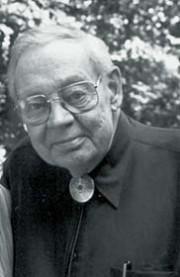
James Deetz

Ph.D. Harvard University 1960
Specialties
Historical archaeology of the Virginian Tidewater, the Eastern Cape frontier of South Africa, and seventeenth century Plymouth Colony, Massachusetts. The greater understanding of culture, cognition, and the impact of mind on the shape, form, and use of the material world. English colonial and post-colonial artifacts and Native American basketry.
February 8, 1930 - November 25, 2000
Tributes for Jim can be found on the page for the Plymouth Colony Site
My interest in historical archaeology, over the last thirty years and more, has been concerned with culture change -- how relationships perceived in the designs and forms of different sets of artifacts relate to organizing principles that tie a whole s ociety together, and how, over time, these shift. But changes have been taking place within anthropology that appear to impact adversely upon this approach. Remember Kent Flannery's Old Timer, who was forced into early retirement because he believed in cu lture as the central paradigm in archaeology? This unfortunate event was precipitated by the theoretical shift that has taken place in anthropology, in which explanations for behavior are no longer traced to culture. I find this situation both sad and dee ply alarming. Leaving aside the simple fact that behavior can be seen as a product of culture, regardless of the many definitions we choose to employ, such a perspective is a rejection of a century or more of thoughtful insight. Are we really prepared to jettison the works and thoughts of people such as E.B. Tylor, Franz Boas, A.L. Kroeber, Leslie White or Claude Lévi-Strauss, to name but a very few? I think not. Of the many definitions of culture put forth since E.B. Tylor, the one I prefer, and find most useful in my work, is that of Walter Taylor, in his 1948 Study of Archaeology. Taylor sees culture as a mental construct, not directly observable, but understandable through its various objectifications, be it ritual practice, social structure, or the m aterial world. It is a definition that permits a structural perspective that I find to be a particularly powerful approach to the study of material culture and cognition. Folklorist Henry Glassie, in his study of folk housing in the Virginia Piedmont, use d the methods of structural anthropology (originating with Claude Lévi-Strauss) to analyze and explicate the profound changes worked on the world view of Virginians between the later eighteenth and early nineteenth century. This approach underlies my own studies, both in New England and the Virginian Tidewater from the early seventeenth century, and on the nineteenth century English frontier in South Africa.
Specializations
Historical archaeology of the Virginian Tidewater, the Eastern Cape frontier of South Africa, and seventeenth century Plymouth Colony, Massachusetts. The greater understanding of culture, cognition, and the impact of mind on the shape, form, and use of the material world. English colonial and post-colonial artifacts and Native American basketry.